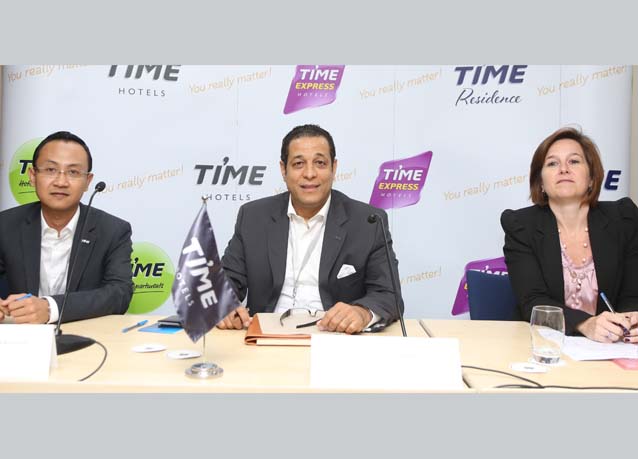 (L-R) Eddie Ignatius, director of training & quality assurance, Time Hotels; Mohamed Awadalla, CEO, Time Hotels; Sandrine Le Biavant, director consultancy, Farnek.
(L-R) Eddie Ignatius, director of training & quality assurance, Time Hotels; Mohamed Awadalla, CEO, Time Hotels; Sandrine Le Biavant, director consultancy, Farnek.
Time Hotels has launched the Middle East’s first carbon offset accommodation initiative with the 'Hotel Stay Carbon Offset Programme', which aims to offset 320 tonnes of carbon emissions by year end, equivalent to flying 60 passengers around the world.
Two of its hotels in Dubai have started with the initiative - Time Oak Hotel & Suites and Time Grand Plaza Hotel, both of which aim to save over 320 tonnes of carbon emissions in this year.
This forms part of the company’s drive to reduce greenhouse gas emissions for a more sustainable future. Each guest that checks-in at one of the participating hotels is offered a chance to contribute.
For AED 15 (US $4.08) per stay, the carbon emissions they generate, by consuming energy and water during their stay, can be offset. Their contribution is then transferred to the myclimate Foundation, a Swiss non-profit organisation that helps companies around the world to offset their carbon emissions.
“We remain focused on developing sustainability into all areas of our business and this initiative highlights our commitment to that objective while continuing to play our part in the UAE’s drive to reduce its carbon footprint,” said Time Hotels CEO Mohamed Awadalla.
“We are offering our guests the opportunity to offset some of the carbon emissions that they generate during their stay with us,” he added.

| Advertisement |
Myclimate calculates the amount of climate-impacting emissions from organisations and invests into high quality carbon offset projects. In this way, the same amount of climate-impacting emissions that are generated by a guest stay are saved somewhere else.
Carbon offset guest stays at Time Hotels will support solar lighting initiatives in rural Ethiopia, by replacing traditional kerosene lamps and funding energy-efficient cooking stoves for displaced families living in temporary camps in Darfur, Sudan.
The hospitality group has been guided through the whole carbon offset programme by the consultancy division of UAE- based facilities management company Farnek, which also designed the cost-to-benefit ratio model and advised Time what carbon credit tariff it should charge, as well as providing a choice of environmental projects for funding consideration.
Farnek was also responsible for training the relevant staff at Time regarding climate protection and how to explain the concept to their guests and to create further awareness of sustainable practices, by saving water and conserving energy.
“The hospitality sector, like many other industries contributes towards the damaging effects of global warming, carbon emissions are simply unavoidable. However, by actually making a commitment to reduce its impact on the environment, Time hotels has set itself apart from the competition, becoming an outstanding ambassador for sustainability best practice,” said Farnek director of consultancy Sandrine Le Biavant.








 Search our database of more than 2,700 industry companies
Search our database of more than 2,700 industry companies









